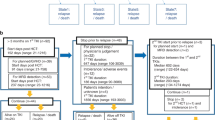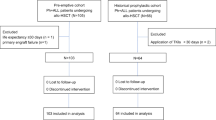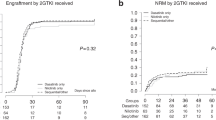Abstract
Second- and third-generation tyrosine kinase inhibitors (TKI) play an important role in the treatment of Philadelphia chromosome-positive acute lymphoblastic leukemia (Ph + ALL). However, data on feasibility and efficacy of using these drugs for persisting or relapsed Ph + ALL after allogeneic stem cell transplantation (alloSCT) are scarce. Based on the EBMT Acute Leukemia Working Party registry, we evaluated the use of second-/third-generation TKI in 140 patients with Ph + ALL, suffering from measurable residual disease (MRD, n = 6), molecular relapse (MRel, n = 23), or hematological relapse (HRel, n = 111) following alloSCT. Treatment included dasatinib in 104, nilotinib in 18, or ponatinib in 18 patients. Forty-nine patients received TKI monotherapy, while 91 received additional treatment. Toxicity of second-/third-generation TKI post alloSCT was comparable to pretransplant use and could be managed with dose reduction or temporary discontinuation. Response rates were 71% (overall) and 61% (following TKI monotherapy). For the entire cohort, 2- and 5-year overall survival (OS) was 49% and 33%, respectively. OS was comparable among patients treated for persisting MRD/MRel and HRel. Among patients treated with TKI monotherapy, 2- and 5-year OS was 38% and 33%, respectively. The data underscore that second-/third-generation TKI are important compounds for the management of active Ph + ALL post alloSCT.
This is a preview of subscription content, access via your institution
Access options
Subscribe to this journal
Receive 12 print issues and online access
$259.00 per year
only $21.58 per issue
Buy this article
- Purchase on Springer Link
- Instant access to full article PDF
Prices may be subject to local taxes which are calculated during checkout




Similar content being viewed by others
References
Kim DY, Joo YD, Lim SN, Kim SD, Lee JH, Lee JH, et al. Nilotinib combined with multiagent chemotherapy for newly diagnosed Philadelphia-positive acute lymphoblastic leukemia. Blood. 2015;126:746–56.
Ravandi F, Othus M, O’Brien SM, Forman SJ, Ha CS, Wong JYC, et al. US intergroup study of chemotherapy plus dasatinib and allogeneic stem cell transplant in Philadelphia chromosome positive ALL. Blood Adv. 2016;1:250–9.
Jabbour E, Kantarjian H, Ravandi F, Thomas D, Huang X, Faderl S, et al. Combination of hyper-CVAD with ponatinib as first-line therapy for patients with Philadelphia chromosome-positive acute lymphoblastic leukaemia: a single-centre, phase 2 study. Lancet Oncol. 2015;16:1547–55.
Chiaretti S, Vitale A, Vignetti M, Piciocchi A, Fazi P, Elia L, et al. A sequential approach with imatinib, chemotherapy and transplant for adult Ph+ acute lymphoblastic leukemia: final results of the GIMEMA LAL 0904 study. Haematologica. 2016;101:1544–52.
Ravandi F. How I treat Philadelphia chromosome-positive acute lymphoblastic leukemia. Blood. 2019;133:130–6.
Ribera JM, Oriol A, Gonzalez M, Vidriales B, Brunet S, Esteve J, et al. Concurrent intensive chemotherapy and imatinib before and after stem cell transplantation in newly diagnosed Philadelphia chromosome-positive acute lymphoblastic leukemia. Final results of the CSTIBES02 trial. Haematologica. 2010;95:87–95.
Giebel S, Labopin M, Socie G, Beelen D, Browne P, Volin L, et al. Improving results of allogeneic hematopoietic cell transplantation for adults with acute lymphoblastic leukemia in first complete remission: an analysis from the Acute Leukemia Working Party of the European Society for Blood and Marrow Transplantation. Haematologica. 2017;102:139–49.
Horowitz M, Schreiber H, Elder A, Heidenreich O, Vormoor J, Toffalori C, et al. Epidemiology and biology of relapse after stem cell transplantation. Bone Marrow Transpl. 2018;53:1379–89.
Giebel S, Czyz A, Ottmann O, Baron F, Brissot E, Ciceri F, et al. Use of tyrosine kinase inhibitors to prevent relapse after allogeneic hematopoietic stem cell transplantation for patients with Philadelphia chromosome-positive acute lymphoblastic leukemia: a position statement of the Acute Leukemia Working Party of the European Society for Blood and Marrow Transplantation. Cancer. 2016;22:2941–51.
Pfeifer H, Wassmann B, Bethge W, Dengler J, Bornhauser M, Stadler M, et al. Randomized comparison of prophylactic and minimal residual disease-triggered imatinib after allogeneic stem cell transplantation for BCR-ABL1-positive acute lymphoblastic leukemia. Leukemia. 2013;27:1254–62.
Tiribelli M, Sperotto A, Candoni A, Simeone E, Buttignol S, Fanin R. Nilotinib and donor lymphocyte infusion in the treatment of Philadelphia-positive acute lymphoblastic leukemia (Ph+ ALL) relapsing after allogeneic stem cell transplantation and resistant to imatinib. Leuk Res. 2009;33:174–7.
Brissot E, Labopin M, Beckers MM, Socie G, Rambaldi A, Volin L, et al. Tyrosine kinase inhibitors improve long-term outcome of allogeneic hematopoietic stem cell transplantation for adult patients with Philadelphia chromosome positive acute lymphoblastic leukemia. Haematologica. 2015;100:392–9.
Caocci G, Vacca A, Ledda A, Murgia F, Piras E, Greco M, et al. Prophylactic and preemptive therapy with dasatinib after hematopoietic stem cell transplantation for Philadelphia chromosome-positive acute lymphoblastic leukemia. Biol Blood Marrow Transplant. 2012;18:652–4.
Klyuchnikov E, Schafhausen P, Kroger N, Brummendorf TH, Osanmaz O, Asenova S, et al. Second-generation tyrosine kinase inhibitors in the post-transplant period in patients with chronic myeloid leukemia or Philadelphia-positive acute lymphoblastic leukemia. Acta Haematol. 2009;122:6–10.
DeFilipp Z, Langston AA, Chen Z, Zhang C, Arellano ML, El Rassi F, et al. Does post-transplant maintenance therapy with tyrosine kinase inhibitors improve outcomes of patients with high-risk philadelphia chromosome-positive leukemia? Clin Lymphoma Myeloma Leuk. 2016;16:466–71.
Shimoni A, Volchek Y, Koren-Michowitz M, Varda-Bloom N, Somech R, Shem-Tov N, et al. Phase 1/2 study of nilotinib prophylaxis after allogeneic stem cell transplantation in patients with advanced chronic myeloid leukemia or Philadelphia chromosome-positive acute lymphoblastic leukemia. Cancer. 2015;121:863–71.
Hirschbuehl K, Rank A, Pfeiffer T, Slawik HR, Schlimok G, Kolb HJ, et al. Ponatinib given for advanced leukemia relapse after allo-SCT. Bone Marrow Transplant. 2015;50:599–600.
Sasaki H, Mitani S, Kusumoto S, Marumo Y, Asano A, Yoshida T, et al. Pre- and post-transplant ponatinib for a patient with acute megakaryoblastic blast phase chronic myeloid leukemia with T315I mutation who underwent allogeneic hematopoietic stem cell transplantation. Int J Hematol. 2019;110:119–23.
Renzi D, Marchesi F, De Angelis G, Elia L, Salvatorelli E, Gumenyuk S, et al. Ponatinib induces a persistent molecular response and graft-versus-host disease/graft-versus-leukemia effect in a patient with Philadelphia-positive acute lymphoblastic leukemia with a T315I mutation following early relapse after allogeneic transplant. Chemotherapy. 2017;62:58–61.
Leoni V, Biondi A. Tyrosine kinase inhibitors in BCR-ABL positive acute lymphoblastic leukemia. Haematologica. 2015;100:295–9.
Goekbuget NBR, Dombret H, Doubek M, Fielding AK, Foa R, Giebel S, et al. Recommendations of the European Working Group for Adult ALL. 1st ed. UNI-MED Verlag AG. 208 s. Unimed Science; 2011. pp. 178–9.
Bruggemann M, Schrauder A, Raff T, Pfeifer H, Dworzak M, Ottmann OG, et al. Standardized MRD quantification in European ALL trials: proceedings of the Second International Symposium on MRD assessment in Kiel, Germany, 18-20 September 2008. Leukemia. 2010;24:521–35.
Apperley JF, Masszi T. Graft-versus-host disease. In: Apperley JF, Carreras E, Gluckman E, Masszi T, editors., Haematopoietic Stem Cell Transplantation. 2012:217–47.
Cortes JE, Saglio G, Kantarjian HM, Baccarani M, Mayer J, Boque C, et al. Final 5-year study results of DASISION: the Dasatinib versus Imatinib Study in treatment-naive chronic myeloid leukemia patients trial. J Clin Oncol. 2016;34:2333–40.
Saglio G, Hochhaus A, Goh YT, Masszi T, Pasquini R, Maloisel F, et al. Dasatinib in imatinib-resistant or imatinib-intolerant chronic myeloid leukemia in blast phase after 2 years of follow-up in a phase 3 study: efficacy and tolerability of 140 milligrams once daily and 70 milligrams twice daily. Cancer. 2010;116:3852–61.
Olivieri A, Cimminiello M, Corradini P, Mordini N, Fedele R, Selleri C, et al. Long-term outcome and prospective validation of NIH response criteria in 39 patients receiving imatinib for steroid-refractory chronic GVHD. Blood. 2013;122:4111–8.
Spyridonidis A, Labopin M, Schmid C, Volin L, Yakoub-Agha I, Stadler M, et al. Outcomes and prognostic factors of adults with acute lymphoblastic leukemia who relapse after allogeneic hematopoietic cell transplantation. An analysis on behalf of the Acute Leukemia Working Party of EBMT. Leukemia. 2012;26:1211–7.
Abou Dalle I, Kantarjian HM, Short NJ, Konopleva M, Jain N, Garcia-Manero G, et al. Philadelphia chromosome-positive acute lymphoblastic leukemia at first relapse in the era of tyrosine kinase inhibitors. Am J Hematol. 2019;94:1388–95.
Ribera JM, Garcia O, Moreno MJ, Barba P, Garcia-Cadenas I, Mercadal S, et al. Incidence and outcome after first molecular versus overt recurrence in patients with Philadelphia chromosome-positive acute lymphoblastic leukemia included in the ALL Ph08 trial from the Spanish PETHEMA Group. Cancer. 2019;125:2810–17.
Jabbour E, Short NJ, Ravandi F, Huang X, Daver N, DiNardo CD, et al. Combination of hyper-CVAD with ponatinib as first-line therapy for patients with Philadelphia chromosome-positive acute lymphoblastic leukaemia: long-term follow-up of a single-centre, phase 2 study. Lancet Haematol. 2018;5:e618–27.
King AC, Pappacena JJ, Tallman MS, Park JH, Geyer MB. Blinatumomab administered concurrently with oral tyrosine kinase inhibitor therapy is a well-tolerated consolidation strategy and eradicates measurable residual disease in adults with Philadelphia chromosome positive acute lymphoblastic leukemia. Leuk Res. 2019;79:27–33.
Pirosa MC, Leotta S, Cupri A, Stella S, Martino EA, Scalise L, et al. Long-term molecular remission achieved by antibody anti-CD22 and ponatinib in a patient affected by Ph’+ acute lymphoblastic leukemia relapsed after second allogeneic hematopoietic stem cell transplantation: a case report. Chemotherapy. 2018;63:220–4.
El Chaer F, Holtzman NG, Sausville EA, Law JY, Lee ST, Duong VH, et al. Relapsed Philadelphia chromosome-positive Pre-B-ALL after CD19-directed CAR-T cell therapy successfully treated with combination of blinatumomab and ponatinib. Acta Haematol. 2019;141:107–10.
Yang F, Yang X, Bao X, Kang L, Zhou L, Wu X, et al. Anti-CD19 chimeric antigen receptor T-cells induce durable remission in relapsed Philadelphia chromosome-positive ALL with T315I mutation. Leuk Lymphoma. 2020;61:429–36.
Rafei H, Kantarjian HM, Jabbour EJ. Targeted therapy paves the way for the cure of acute lymphoblastic leukaemia. Br J Haematol. 2020;188:207–23.
Acknowledgements
We owe thanks to all the contributing centers.
Author information
Authors and Affiliations
Corresponding author
Ethics declarations
Conflict of interest
The authors declare that they have no conflict of interest.
Additional information
Publisher’s note Springer Nature remains neutral with regard to jurisdictional claims in published maps and institutional affiliations.
Supplementary information
Rights and permissions
About this article
Cite this article
Hirschbühl, K., Labopin, M., Houhou, M. et al. Second- and third-generation tyrosine kinase inhibitors for Philadelphia-positive adult acute lymphoblastic leukemia relapsing post allogeneic stem cell transplantation—a registry study on behalf of the EBMT Acute Leukemia Working Party. Bone Marrow Transplant 56, 1190–1199 (2021). https://doi.org/10.1038/s41409-020-01173-x
Received:
Revised:
Accepted:
Published:
Issue Date:
DOI: https://doi.org/10.1038/s41409-020-01173-x
This article is cited by
-
Reduced-intensity allogenic transplantation for children and adolescents with Philadelphia chromosome-positive acute lymphoblastic leukemia
Annals of Hematology (2024)
-
Total body irradiation versus busulfan based intermediate intensity conditioning for stem cell transplantation in ALL patients >45 years—a registry-based study by the Acute Leukemia Working Party of the EBMT
Bone Marrow Transplantation (2023)
-
Effect of prophylactic or pre-emptive use of tyrosine kinase inhibitors post-Allo SCT in bcr-abl positive acute lymphoblastic leukemia: a subanalysis of GITMO ph-positive ALL study
Bone Marrow Transplantation (2022)
-
Cord blood resilience in a patient with relapsing Ph + B lymphoblastic acute leukemia after hematopoietic stem cell transplantation
Annals of Hematology (2022)
-
Association between measurable residual disease kinetics and outcomes of Philadelphia chromosome-positive acute lymphoblastic leukemia
Annals of Hematology (2021)



